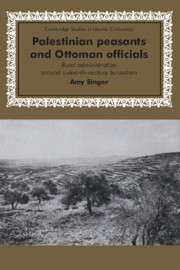Book contents
- Frontmatter
- Contents
- List of maps
- List of tables
- Preface
- Note on transliteration
- Note on money, weights, and measures
- 1 Peasants, Palestine, and the Ottoman Empire
- 2 Aspects of Authority
- 3 The Rules of Local Administration
- 4 Real Accounts and Accounting
- 5 Between Rebellion and Oppression
- 6 Realities and Routines
- Appendices
- Notes
- Bibliography
- Index
3 - The Rules of Local Administration
Published online by Cambridge University Press: 03 May 2011
- Frontmatter
- Contents
- List of maps
- List of tables
- Preface
- Note on transliteration
- Note on money, weights, and measures
- 1 Peasants, Palestine, and the Ottoman Empire
- 2 Aspects of Authority
- 3 The Rules of Local Administration
- 4 Real Accounts and Accounting
- 5 Between Rebellion and Oppression
- 6 Realities and Routines
- Appendices
- Notes
- Bibliography
- Index
Summary
I have ordered that you [sancakbeyi and kadi of Jerusalem] look into this: whether from olden times in this region these aforementioned matters [taxes] were habitually taken in the manner mentioned; whether noble orders were not given contrary to it; and whether they [persons deputized to collect taxes from the villages] take more [than habitually due] to the şer‘, the kanun, and the defter; [if so, then] prevent [this]. In these matters henceforward let [the taxes] be taken according to the defter, let nothing extra be taken contrary to şer‘, kanan, and the defter…
Relations between the Ottoman officials and the local peasantry were governed by the statutes of the Muslim holy law (shari‘a), Ottoman regulations (kanun), and local customary practices (‘örf). The three sources of law did not govern entirely discrete areas. All together served as the basis for decisions by the kadi, especially in regard to administrative practices. The shari‘a laid down rules about tithes on agricultural produce and the poll tax on non-Muslim subjects (zimmis). The more general guidelines of the shari‘a were often supplemented by the detailed provisions of kanuns. And the kanuns were typically informed by local practice as discovered by the Ottoman officials who carried out the initial provincial surveys and those who governed in the numerous provinces of the empire. The Ottoman administrative regime, therefore, did not impose a rigid code of laws uniformly on all conquered populations of the empire.
- Type
- Chapter
- Information
- Palestinian Peasants and Ottoman OfficialsRural Administration around Sixteenth-Century Jerusalem, pp. 46 - 63Publisher: Cambridge University PressPrint publication year: 1994



